 17,000 on-campus interviews were conducted during the past year, a figure 30 percent higher than for the previous year. Job fairs were sold out, with 625 employers conducting interviews at Tech -- a 10 percent increase.
17,000 on-campus interviews were conducted during the past year, a figure 30 percent higher than for the previous year. Job fairs were sold out, with 625 employers conducting interviews at Tech -- a 10 percent increase.Magazine ranks university's offerings in top 25
Class of '98 enters booming job market
Foundation wins powerful wireless broadcast spectrum
Health and fitness center named for James McComas
Solitude funded $50,000 for restoration
Giovanni's class forms slave choir
Computer engineering programs to expand
Alumni recognized at Founders Day
Lee Hall's name will remain
New architecture building named Burchard Hall
Women's cross-cut team wins first prize
Engineers win $9.6-million contract
Kraige selected Virginia Professor of the Year
Plaut wins SCHEV faculty award
Engineers win $9.6-million contract
Graduate programs at one of Virginia Tech's colleges and several academic programs were recently recognized by the U.S. News and World Report's 1998 "America's Best Graduate Schools" issue.
According to the survey, the College of Engineering ranked 25th among the 219 graduate engineering schools surveyed. The magazine also ranked Tech's Vocational and Technical Education Program sixth in the nation and ranked the Center for Public Administration and Policy among the country's top 10.
U.S. News ranks the nation's 191 graduate education programs that grant Ph.D.s or Ed.D.s using five attributes: faculty resources, research activity, student selectivity, and two separate measures of reputation.
Virginia Governor James Gilmore spoke at the May 11 undergraduate commencement ceremonies, during which Virginia Tech conferred more than 2,900 bachelor's degrees. At the graduate commencement, Tech awarded 1,078 master's degrees, 207 Ph.D.s, 81 DVMs, 48 Ed.D.s, 51 associate of agriculture degrees, and 23 certificates of advanced study.
Many graduates had jobs lined up before getting their diplomas in their hands. Nearly 17,000 on-campus interviews were conducted during the past year, a figure 30 percent higher than for the previous year. Job fairs were sold out, with 625 employers conducting interviews at Tech -- a 10 percent increase.
17,000 on-campus interviews were conducted during the past year, a figure 30 percent higher than for the previous year. Job fairs were sold out, with 625 employers conducting interviews at Tech -- a 10 percent increase.
Starting salaries for many students are higher than expected. An undergraduate finance major received offers ranging in salary from $35,000 to $42,000; an undergraduate chemistry major accepted a consulting job at more than $40,000; and an MBA student with a B.S. in computer engineering and work experience negotiated a salary in the upper 60s with a Big Six firm.
Jim Malone, director of career services at Tech, has called the current job market the best in perhaps a decade and a half. The market continues to look strong for 1999 graduates. Already, corporate slots for on-campus interviews are booked up for most of next fall.
The Virginia Tech Foundation, on behalf of the university's research and public service missions, procured licenses to operate the wireless, broadcast spectrum for the greater Roanoke, Danville, Martinsville, and Bristol market areas.
The action took place in a nationwide auction by the Federal Communications Commission making available for the first time an enormous chunk of the broadcast airwaves that was previously inaccessible. This spectrum, called Local Multipoint Distribution Service (LMDS) is so powerful, it can transmit 8,000 high-density color photographs per second; provide high-speed Internet access at 100 times current modem rates; or carry more than 200 video channels simultaneously. Tech was the only university to purchase spectrum in the auction.
Virginia Tech will use the spectrum to establish a research test-bed for advanced wireless communications with particular emphasis on rural regions of the country. Virginia Tech President Paul Torgersen says the university intends to develop the test-bed in partnership with regional communities, businesses, and the communications industry.
In addition to the spectrum's extraordinary information carrying capacity, LMDS is unique in that the service can be customized for each local area. One community may use most of the bandwidth for Internet access; another may use it primarily for video teleconferencing, for example.
The Virginia Tech Board of Visitors named the new student health and fitness center in honor the late James D. McComas, university president from 1988 -1993. McComas, noted for his programs to increase the quality of student life on campus, pressed hard for a new center to accommodate rising student enrollment and demand for athletic recreational outlets.
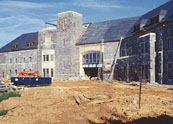 McComas is generally credited with stabilizing the university during a turbulent fiscal era. Placing special emphasis on improving undergraduate education, McComas protected faculty positions as the university lost $38 million in state funding beginning in 1989. He established the Center for Excellence in Teaching and bolstered the university honors program. He stressed the special role of academic advising by personally advising 16 students.
McComas is generally credited with stabilizing the university during a turbulent fiscal era. Placing special emphasis on improving undergraduate education, McComas protected faculty positions as the university lost $38 million in state funding beginning in 1989. He established the Center for Excellence in Teaching and bolstered the university honors program. He stressed the special role of academic advising by personally advising 16 students.
McComas Hall is a 118,000 square-foot, multi-purpose complex serving student health and recreation needs. It will include the student health center, counseling center, basketball courts, jogging track, weight training rooms, fitness rooms, and a swimming pool. Dedication of McComas Hall is planned for October 1998.
Solitude, the oldest structure on the Virginia Tech campus, has been funded $50,000 by the General Assembly for restoration.
Two log cabins form the core of the nearly 200-year-old building, which was once home to Virginia Governor John Floyd (1830-34) and his son Governor John Buchanon Floyd (1849-52). Robert Preston, a founder of the Olin and Preston Institute, also once owned the Solitude estate, which became the center of what is now Virginia Tech.
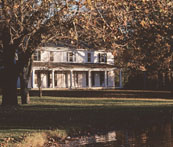 Solitude was placed on the National Register of Historic Places and named a Virginia Historic Landmark in 1989.
Solitude was placed on the National Register of Historic Places and named a Virginia Historic Landmark in 1989.
Funds will go toward repairing termite damage, fixing the roof, rehabilitating the interior, restoring outbuildings, and fixing drainage and water damage problems. When restoration is complete, Solitude will become the base of operation for Tech's Appalachian Studies program and Center for Preservation and Rehabilitation Technology. Receptions, exhibits, and performances will be held in the house's parlor and passage.
Solitude has also benefited from generous in-kind donations from alumni and friends. Phillip Sfreddo (urban affairs '93) donated termite control services; Jess Newbern will contribute heating and ventilation duct work; and Marshall Concrete Products and HICO Inc. will also contribute their services. For further information, contact Elizabeth C. Fine, Appalachian Studies Program, Center for Interdisciplinary Studies, 124 Lane Hall, Virginia Tech, (540) 231-9593.
Slave gatherings were illegal in many parts of America. But when the spirit moved them to praise their Lord, some would sneak off to "hush arbors" to sing. Members of professor Nikki Giovanni's Black Aesthetics class formed a slave choir to learn traditional spirituals and has performed under the name Denmark Vesey Voices.
In response to the demand for more computer scientists and engineers resulting from Virginia's fastest growing technology business sector, the Virginia Tech Board of Visitors has approved the establishment of M.S. and Ph.D. degrees in computer engineering in the university's Bradley Department of Electrical and Computer Engineering (ECE).
In Northern Virginia, which now has the second-highest regional concentration of high-tech companies in the nation, about 19,000 job vacancies exist among high-technology companies. Multi-billion dollar investments by Motorola, Siemens/Motorola, IBM/Toshiba, Gateway 2000, and Oracle will greatly expand the demand for high-tech employees in much of the state.
Tech's new graduate computer engineering program will include in-depth courses in computer engineering with a balanced exposure to hardware and software. It will be offered at the Northern Virginia campus, as well as in Blacksburg.
Skelton receives Ruffner Medal
 William Skelton (agriculture '40), dean emeritus of Virginia Tech's Extension Division, was awarded the William H. Ruffner Medal at Founders Day for his distinguished service to the university.
William Skelton (agriculture '40), dean emeritus of Virginia Tech's Extension Division, was awarded the William H. Ruffner Medal at Founders Day for his distinguished service to the university.
During Skelton's 39-year career in Extension, he held a succession of leadership roles, including director of 4-H programs and director of the Cooperative Extension Service. Skelton was dean of Extension from 1965 until his retirement in 1979.
Skelton has also served as president of the Old Guard, a member of the Board of Directors for the Virginia Tech Foundation, a delegate to two National White House Conferences on Youth, and president of Epsilon Sigma Pi.
Skelton is currently president of the Virginia Tech Alumni Association and is leading an effort to establish a new alumni center on campus. He still works to secure funds for Virginia Tech through the private sector.
Bird and Russel rewarded for service
General District Court Judge Daniel Bird Jr.(dairy science '60) and George "Buddy" Russell (animal science '52) received 1998 Alumni Distinguished Service Awards on Founders Day.
Bird served on the board of the alumni association for a total of 19 years during his political career. He was elected first vice president of the association in 1991 and president-elect in 1992.
Bird was a partner in the law firm of Bird and Slavin in Wytheville for 26 years. He was elected to the Virginia General Assembly in 1976. He was appointed General District Court judge for the 17th Judicial Circuit in 1992.
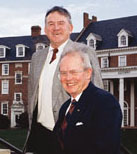 |
Russell served the alumni association for over 27 years, joining in 1968 as director of alumni affairs. Through the '70s and '80s, he oversaw the creation of new alumni activities. He served as president of the alumni association for 10 years and was named vice president in 1991, when alumni relations became an official part of the university. He held this post until his retirement in 1995.
Russell remains involved with Tech's alumni and retired emeriti faculty organizations. |
|
|
Special citation for Bagley
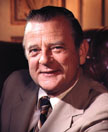 Richard Bagley (business '48), former state legislator, was given a special citation at Founders Day for his lifetime of service to Virginia and Virginia Tech.
Richard Bagley (business '48), former state legislator, was given a special citation at Founders Day for his lifetime of service to Virginia and Virginia Tech.
Bagley, president of Bagley Investment Company, served 20 years in the Virginia House of Delegates before becoming state secretary of commerce and secretary of economic development in 1985. He is credited with helping create 51,000 new jobs in Virginia.
Bagley is a past president of the alumni association board and a past member of the Virginia Tech Foundation board. He served on the university's board of visitors as long as state law would allow. Bagley was also a member of the Business Advisory Council and the Corporation and Foundation Committee for the Campaign for Excellence.
Virginia Tech President Paul Torgersen has issued a statement declining to recommend a name change for Lee Hall, which was named in 1968 for alumnus and 50-year electrical engineering professor Claudius Lee.
Suggestions to change the hall's name arose when a student discovered Claudius Lee pictured in the 1896 Bugle on a student organization page associated with the Ku Klux Klan.
Torgersen arranged a historical review of the yearbook material by a committee headed by history professor Peter Wallenstein. Torgersen also consulted with John Kneebone a specialist in the history of the Klan at the State Library of Virginia.
Investigation found no evidence of Klan activity in Virginia during Claudius Lee's student days. Torgersen condemned the yearbook material as "sickening," but concluded it unlikely that the pages "represented real Klan activity or even genuine student organizations."
A new underground architecture building, completed in early summer, was named for the late Charles Burchard, founding dean of the College of Architecture and Urban Studies.
Burchard, an innovative leader in architecture education, transformed the Department of Architecture into one of the nation's top colleges during his tenure as dean from 1965-1979. A university distinguished professor, he was active nationally as a director of the National Architectural Accrediting Board and president of the Association of Collegiate Schools of Architecture.
Burchard received his bachelor's degree from MIT and his master's in architecture from the Harvard School of Design, where he studied under world-renowned architect Walter Gropius.
Burchard Hall will house 42,000 square feet of studio and shop space for the architecture and industrial design programs. Four massive pyramidal skylights illuminate underground studios. The building addition was designed by the Norfolk firm, Shriver and Holland, architects of Cowgill Hall.
Virginia Tech's women's cross-cut team wins first prize in the 41st Annual Association of Southern Forestry Clubs Conclave. The Tech Forestry Club placed second in technical events and fourth overall in the competition with 12 other colleges.
Virginia Tech's Fiber and Electro-Optics Research Center (FEORC) has received a $9.6-million grant from the Naval Research Laboratory for an optical sciences research program.
The five-year research project will focus on optical fiber materials, optoelectronics, and fundamental optical materials science related in part to microelectronics, including optical microchips.
Microelectronics is big business in Virginia with the recent moves by Motorola, IBM/Toshiba, and Motorola/Siemens to build microelectronic fabrication plants in the state. FEORC's research in microelectronics has already shown the possibility of "significant improvements" in the manufacturing of these devices, says Rick Claus, FEORC director.
FEORC, Virginia's first Center for Innovative Technology's (CIT) Technology Development Center, is the home to the country's largest educational fiber optics group. Members of FEORC have submitted more than 100 patent disclosures and published more than 1,000 papers in lightwave technology and applications.
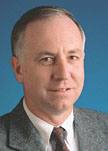
Virginia Tech engineering faculty member Glenn Kraige has been named the Virginia Professor of the Year by the Carnegie Foundation for the Advancement of Teaching and the Council for Advancement and Support of Education (CASE).
Kraige, a Tech professor of engineering science and mechanics since 1975, was selected from among 15 nominees from Virginia. Kraige has worked since 1983 on personal computer software designed to aid in the instruction and learning of statics and dynamics in projects sponsored by SCHEV and the National Science Foundation. Kraige co-authored the second, third, and fourth editions of Engineering Mechanics, an internationally recognized series of textbooks on statics and dynamics.
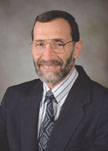 Civil engineering professor Raymond Plaut has been awarded the 1998 Outstanding Faculty Award from the State Council of Higher Education for Virginia (SCHEV).
Civil engineering professor Raymond Plaut has been awarded the 1998 Outstanding Faculty Award from the State Council of Higher Education for Virginia (SCHEV).
Plaut is one of 11 faculty members selected from colleges and universities throughout Virginia to be recognized by SCHEV for excellence in teaching, research, and public service. He is internationally known for his research in the use of inflatable dams to prevent loss of life and property during floods.
Plaut, whose first teaching experience was volunteer tutoring of illiterate inmates at San Quentin prison while a graduate student, came to Virginia Tech in 1975 as the university's youngest full professor at that time. He is the only Tech faculty member to receive both the Alumni Association W.E. Wine Award for Excellence in Teaching and the association's Award for Research Excellence.
Chester "Skip" Watts (geology '74), a Radford geology professor, was also selected for the competitive state award.
Virginia Tech's Fiber and Electro-Optics Research Center (FEORC) has received a $9.6-million grant from the Naval Research Laboratory for an optical sciences research program.
The five-year research project will focus on optical fiber materials, optoelectronics, and fundamental optical materials science related in part to microelectronics, including optical microchips.
Microelectronics is big business in Virginia with the recent moves by Motorola, IBM/Toshiba, and Motorola/Siemens to build microelectronic fabrication plants in the state. FEORC's research in microelectronics has already shown the possibility of "significant improvements" in the manufacturing of these devices, says Rick Claus, FEORC director.
FEORC, Virginia's first Center for Innovative Technology's (CIT) Technology Development Center, is the home to the country's largest educational fiber optics group. Members of FEORC have submitted more than 100 patent disclosures and published more than 1,000 papers in lightwave technology and applications.
Home | News | Features | Research | Philanthropy | President's Message | Athletics | Alumni | Classnotes | Editor's Page